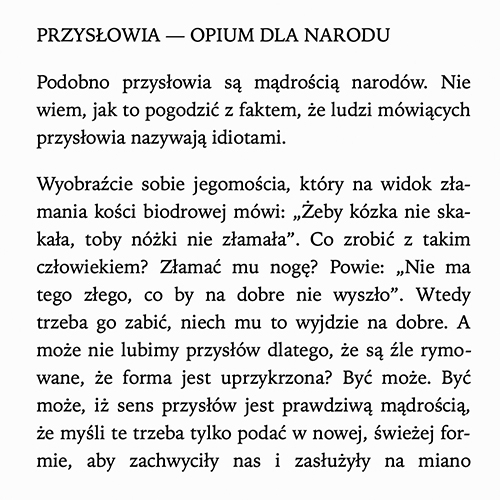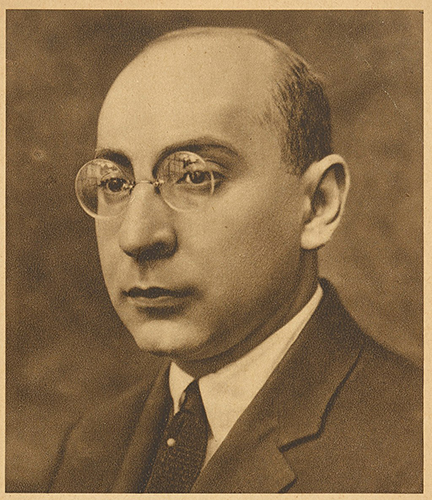Explore Feuilletons
Proverbs – The Opium of the People
Item sets
Abstract
Title (English)
Title (original)
Date Issued
Place issued
Author
Language
Content type
Translator
Contributor
URI
Keywords
Original Text
Translation
Antoni Słonimski, “Proverbs – The Opium of the People,” 1928. Translated by Zosia Niedermaier-Reed and Ofer Dynes1
They say proverbs are the wisdom of the nations. I don’t know how that can be true when people who use proverbs should be called idiots.
Read Full
Picture this: a gentleman sees someone break their hip bone and proceeds to say, “if the goat hadn’t jumped then it wouldn’t have broken its leg.” What do you do with someone like that? Break his leg? He’ll just say “every cloud has a silver lining.” Then maybe he should try dying, and see what good comes from that. Maybe we don’t like proverbs because they don’t rhyme well, or because their form is unappealing? Maybe. Maybe proverbs really do contain some wisdom, and these ideas just need to be presented in a new, fresh form to entertain us and allow them to merit being known as the people’s wisdom. After all, the short rhymes and aphorisms that decorate each day in the calendar have been shaped by centuries of experience, by the achievements of hundreds of generations. Proverbs were created by people after all, and the voice of the people is the voice of God. Although the proverbs of those who follow Mohammed, Jehovah, Vishnu and Brahma don’t differ drastically, these people’s deities are each other’s rivals.
The Japanese say “carry an umbrella even when it’s sunny” while the Poles say “God helps those who help themselves.” But any man walking around with an umbrella when it’s sunny is assumed to be an idiot or a snob who aspires to be an Englishman. Strongboxes and lockers usually fall victim to thefts and burglaries.
No, gentlemen, proverbs are not the people’s wisdom, but tedium, rubbish, and boredom that simpletons and penmanship teachers exhaust us with. If anyone thinks that these age-old truths might be entertaining in a new form, let them be fooled. I know one pompous fellow who doesn’t do anything else but sow these pearls and seeds of popular wisdom. This fellow says things like: “The school of hard knocks teaches you that people who profit from others’ harm will have bad luck.” At first glance, this seems to be a very clever statement, but it is really just a rephrasing of the old and stupid saying “those who dig holes under others will fall into them themselves.” But of course, those who dig holes do the best in life. This proverb has existed for hundreds of years, but it has only been proven right once in our history. I’m thinking of the honest and solid authors of the heist beneath the State Printing Office. But this joyful event was conceived more reliably and sympathetically than several legal contracts agreed upon for the supply of gas masks.2
You can present proverbs any way you want, but even in their most sophisticated forms, proverbs are always idiotic statements: “The peasant shoots but God carries the bullets.” Well said.
This proverb appeared when firearms weren’t precise enough. Modern naval artillery manufacturers would surely disagree with the saying – artillery for which God would carry the bullets would not have a good market value. Let us continue: “The early bird catches the worm,” “too many cooks spoil the broth.” Insulting sayings. We offer them as consolation for coalfield workers who make a mere 80 zloty a day. They will split their sides laughing at how the poor factory owner with too many cooks will starve to death. These people wake up at five in the morning to make their 80 zloty and giggle gleefully about the fact that the stupid factory owner who sleeps until one in the afternoon won’t get a thing.
The most insulting of all are the inspirational sayings: “Genius is one percent inspiration, ninety nine percent perspiration” or ”Just because the boss can do it doesn’t mean you can, idiot.” Only dim-witted idiots and people with no ambition can follow these proverbs. In a healthy society, they ought to be covered in kerosene and burnt. Those who remain and who want to can use the motivational sayings that warp morality and voice resignation. Although using proverbs isn’t all that simple. Which should we forgive? Which is false and which is true, if two contradict each other? One proverb says, “God gives and God takes away.” Alright, but then another proverb says, “Those who give and then take away will wind up in hell.”
“Strike while the iron’s hot” loudly proclaims one proverb, “What is delayed will not run away” confidently whispers another. Gentlemen, to hell with the people’s wisdom.
- The first publication we were able to locate is in: Antoni Słonimski, Mętne łby. (Warszawa: Bibljoteka Groszowa, 1928]. We used the 1929 edition, pages 27-31. ↩
- This is a reference to the robbery of the Polish State Printing Office (Państwowe Zakłady Graficzne, also translated as the Polish Security Printing Works), the treasury’s facility that produced banknotes, conducted by Stanisław Cichocki in 1927 by digging a tunnel dozens of meters long while wearing a gas mask. The police failed to present sufficient evidence tying Cichocki to the crime, so he was released in 1929 and immediately began to work on his next robbery. ↩
Commentary
Antoni Słonimski, “Proverbs – The Opium of the People,” 1928. Commentary by Ofer Dynes
Antoni Słonimski (1895-1976) was a Polish author, translator, and journalist who served as the president of the Polish Writers Union between 1956 and 1969, that is, during the Polish October, a period of relative liberalization that marked the end of Stalinism in Poland. Słonimski was the grandson of Hayim Selig Słonimski (1810-1904), founder of the first Hebrew weekly newspaper, Ha-tsefira. His father converted to Christianity and married a Catholic woman, and Słonimski was raised as a Christian. He was a key figure in the Polish poetry scene. Throughout his life, he fought for social justice and cultural freedom in Poland and traveled to Palestine, Brazil, and the Soviet Union.
Read Full
“Proverbs – The Opium of the People” (1928), as the triple pun of its title suggests, offers three distinct effects. First, it ridicules the Polish idiom “przysłowia - mądrość narodów,” which means “proverbs, the wisdom of the people.” Polish culture, as it is revealed to us in proverbs, is retrograde, ignorant, unrefined, parochial, and marked by obscurantism and bigotry. It displays anti-intellectual reliance on tradition and experience rather than on intellectual creativity and innovation. Słonimski invokes the term the “school of hard knocks,” the approximate American equivalent of the Polish "nieubłagana logika dziejów” which literally means “the inevitable logic of history.” From Słonimski’s perspective, the things that can be learned at the “school of hard knocks,” which can also be translated as “the university of life,” favor the past over the future. In the case of these equivalent English idioms, Słonimski surely would have said that the decidedly anti-intellectual meaning of this “school” favors “street-smarts” over knowledge gleaned from real academic institutions. Polish idioms are filled with centuries-old unreliable guns which shoot uncontrollably, God knows where, and feudal privileges that shamefully replicate themselves well into the twentieth century, markers of inequality and abusive labour practices that can hardly be seen as a source of national pride.
Second, the text subverts the Marxist vision of religion as the opium of the people, ridiculing the cult of the Polish language in independent Poland. According to the 1931 census, 11 million of the 31 million residents of the republic were not native speakers of the language. Słonimski’s caustic ridicule of idioms is also a parody on the valorization of idiomatic Polish, with its marked Catholic overtones. After all, Słonimski reminds his readers, the proverbs of those who follow Mohammed, Jehovah, Vishnu and Brahma are, fundamentally, very similar. To be sure, in light of the negligible number of Muslims, Hinduists, or Vaishnavas in interwar Poland, this is a reference to the animosity towards Jews, who constituted a third of the population of Warsaw.
Third, the article ridicules the most basic political vocabulary. Słonimski, who was deeply antagonistic to keywords such as “fatherland,” “compatriot,” or “nation,” pokes fun at terms such as “lud” - people, or “naród” - nation. If the idioms of the nation are not very bright, surely this doesn’t bode well for Polish nationalism. And if, as the Polish idiom tells us, “glos ludu jest głosem Boga” - the voice of the people is the voice of God - what does that say about the people and their God?
Further Reading:
- Harold B. Segel, Stranger in Our Midst: Images of the Jew in Polish Literature (Ithaca: Cornell University Press, 1996)
- Artur Sandauer, On the Situation of the Polish Writer of Jewish Descent in the Twentieth Century (Jerusalem: Hebrew University Magnes Press, 2005)
- Marci Shore, Caviar and Ashes: A Warsaw Generation’s Life and Death in Marxism, 1918-1968 (New Haven: Yale University Press, 2006)
- Patryk Zakrzewski, “Poland’s Cultural Scene: A Snapshot from 1918,” CulturePL, 31 October 2018


